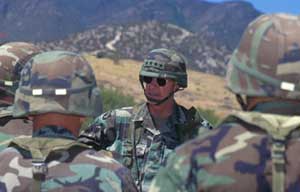Tips for Military Personnel Transitioning to the Civilian Workforce
There are plenty of good reasons for employers to hire veterans. Veterans are recognized for their leadership, teamwork,
technical savvy, discipline, ability to perform under pressure and many more valuable attributes. As such, veterans represent
an important opportunity that smart businesses can capitalize on.

Veterans who have defended their country and its interests are admirable; and the sentiment to hire veterans is high.
Many of the skills developed in the military can readily carry over to duties and responsibilities in the civilian sector.
With all the good that veterans bring to the table, there can also be some challenges. This is due largely to concerns
about the military being more rigid, structured and autocratic than the private sector. This culture-gap can make some employers
a little hesitant when considering veterans for certain positions. Fortunately, smart employers know these challenges are
minimal and easily managed; but there are still some who need a little convincing.
Another challenge faced by veterans transitioning to the civilian workforce is that many recruiters and hiring managers
have little, if any, military background. This puts the veteran in the position of having to translate military terminology
and experience into their civilian equivalents. Veterans may find that they need to talk less about the actual duties they
performed, and more about the planning, organizing, teamwork, and execution skills that were required to get the job done.
If you have a military service in your background or are recently separated from military service, the following tips
will enhance your job search potential. They will help you portray the skills and expertise you acquired in the military
in a way that is more in-sync with what employers in the private sector are seeking.
Things to Consider
Always be proud of your military service but, during your job search, consider the following:
- Minimize Military Jargon: Unless you know otherwise, assume the interviewer knows
little about the military. To help assure the interviewer isn’t confused, try to put your military job titles, responsibilities,
accomplishments, etc. into terms a non-military person would understand. You can explain to them that military titles,
etc. can be confusing or even misleading. You are therefore using more understandable, but equivalent civilian terminology.
The same general concept applies to resumes and cover letters.
- Translate Education and Training to Civilian Equivalents: Interviewers are smart
people, but unless they have a military background similar to yours, they may need some help. For example, they may
not fully appreciate how your military education and training will translate to the private sector. To overcome this,
try to portray your military education in terms of knowledge or skills that you can readily apply to non-military jobs.
- Demilitarize Your Presentation: Recognize that most private sector organizations
are less rigid than their military counterparts. If you’re being overly serious, sitting straight-backed in your chair
and repeatedly saying "Sir or Mam," you may cause the interviewer to question how well you’ll fit in with the workplace
culture. Demonstrate your flexibility, be social, avoid using acronyms and appear relaxed.
- Capitalize on Your Relevant Military Accomplishments: While you may have to demilitarize
some of your discussion with the interviewer, don’t be afraid to discuss noteworthy military accomplishments. Your military
experience is an important asset. Be prepared to talk about relevant training, certifications, advancement, resource
management, cross-functional skills, accomplishments, etc. As always, try to relate your experience to the requirements
of the job opening.
- Use Interview Trainer: Be sure to review the Military question category in the
Interview Trainer. However; you’ll find that the vast majority of interview questions that will be asked of veterans
will be the same general questions that apply to all job candidates, regardless of military service. Interviewers will
want to know about your education, skills, accomplishments, attitudes, job knowledge, etc. and see how closely they
match the requirements of the job. Answers to such questions are generally independent of whether those attributes were
attained in the military or the private sector.
Keep in mind the employer is trying to identify transferable skills. Think about the skills, knowledge, education,
experience, etc. you attained during your military experience and translate them to their civilian equivalents for the
job opening. You’ll find that most of your skills such as communication, teamwork, budgeting, management, training,
logistics, etc. are readily transferable.
Google is supporting military veterans by enabling transitioning service members to enter their U.S. military occupational
specialty code (MOS, AFSC, or NEC) into the Google job search bar and get relevant civilian job results. For example,
enter “Jobs for Veterans” in Google and you will be prompted to enter a MOS code. Google will then present a list of
relevant job openings.